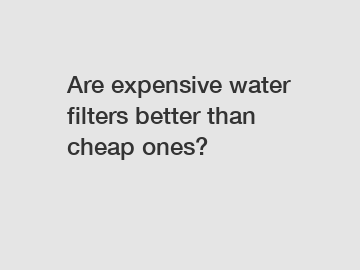Are expensive water filters better than cheap ones?
Clean, pure water is essential for our well-being, and one of the easiest ways to ensure its quality is by using a water filter. However, with countless options flooding the market, making a wise purchasing decision can be overwhelming. The persistent debate about whether expensive water filters are superior to their cheaper counterparts has left many puzzled. In this blog, we will delve into this contentious question to uncover the truth behind the price tag.
1. Filtering Efficiency.
When it comes to water filters, the primary concern is their ability to effectively remove impurities. Expensive water filters often boast advanced filtration systems that use multiple stages or incorporate cutting-edge technologies. These intricate designs theoretically enable more efficient removal of contaminants such as chlorine, heavy metals, and bacteria. While this can be advantageous in certain circumstances, it doesn't necessarily mean cheaper filters are ineffective.

Many budget-friendly water filters employ activated carbon or sediment filters, which effectively tackle common pollutants found in tap water. These filters may not possess the extensive list of features, but they can still provide adequate filtration for most households. It's important to consider the specific needs of your household and the quality of your water supply before investing in an expensive water filter.
2. Durability and Longevity.
Another factor to contemplate is the durability and lifespan of water filters. Expensive filters often offer higher-quality materials, ensuring longevity and consistent performance. However, this is not a guarantee that cheaper filters will fall apart after a few months.
The key is to look for reliable brands that offer quality products at an affordable price. Reviews and customer feedback can provide invaluable insights into a filter's durability. Additionally, checking the filter's certification, such as NSF (National Sanitation Foundation) or WQA (Water Quality Association), will help you determine if it meets industry standards.
3. Maintenance and Replacement Costs.
Buying a water filter is not just a one-time investment; it involves ongoing maintenance and replacement costs. Expensive filters may come with additional features that require costly filter replacements or regular maintenance. On the other hand, cheaper filters typically have more straightforward maintenance requirements and replacements that won't break the bank.
It's crucial to factor in the long-term costs of owning different types of filters. Cheap filters with easily accessible replacement parts may often outweigh the higher upfront investment of pricier counterparts.
4. Water Usage and Personal Needs.
The filtration needs of households vary depending on factors like geographic location, water source, and specific contaminants present. While some regions have relatively clean water, others may face more significant challenges with water quality.
Expensive filters often cater to specific issues, offering specialized filtration for unique water conditions. However, if your water supply is already of relatively good quality, an expensive filter may be unnecessary. Cheaper filters can effectively handle common impurities found in most tap water, making them a practical and cost-effective option.
5. Environmental Impact.
The environmental impact of different water filters is a significant consideration for many conscious consumers. Expensive filters may be known for utilizing more sustainable materials, producing less waste, or even being recyclable. However, this doesn't mean cheaper filters can't be environmentally friendly.
Many economical filters now prioritize sustainability, focusing on reducing plastic waste through refillable filter cartridges or biodegradable packaging. By researching eco-friendly options within your budget range, you can find filters that align with your values and reduce your carbon footprint.
Conclusion.
After examining the complexities surrounding the debate between expensive and cheap water filters, it becomes clear that affordability doesn't necessarily equate to inferiority. While expensive filters may offer additional features and specialized filtration capabilities, this doesn't diminish the effectiveness of cheaper alternatives. For most households, a budget-friendly filter can provide satisfactory results without compromising on water quality.
Remember, understanding your household's specific filtration needs, considering long-term maintenance costs, and prioritizing sustainability should be the guiding factors in your decision-making process. Choose a water filter that suits your requirements and invest wisely to ensure the health and well-being of yourself and your loved ones.
Are you interested in learning more about Water purification photocatalyst filter, activated carbon filter element Denmark, offices photocatalyst filter? Contact us today to secure an expert consultation!


